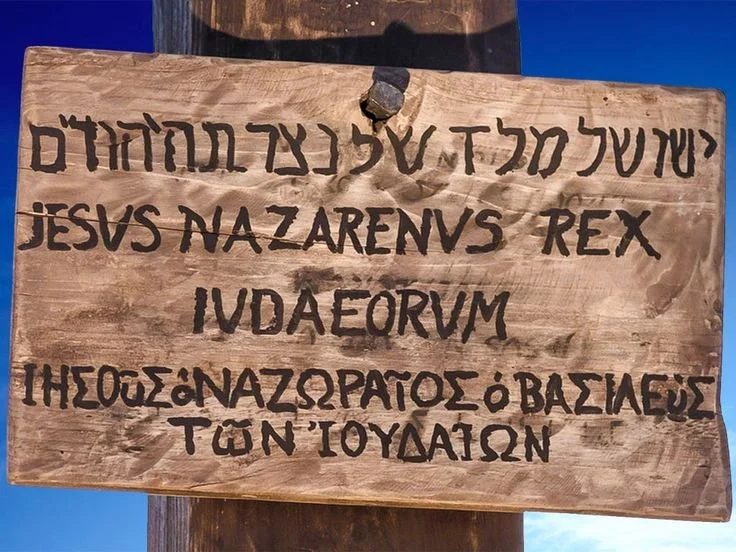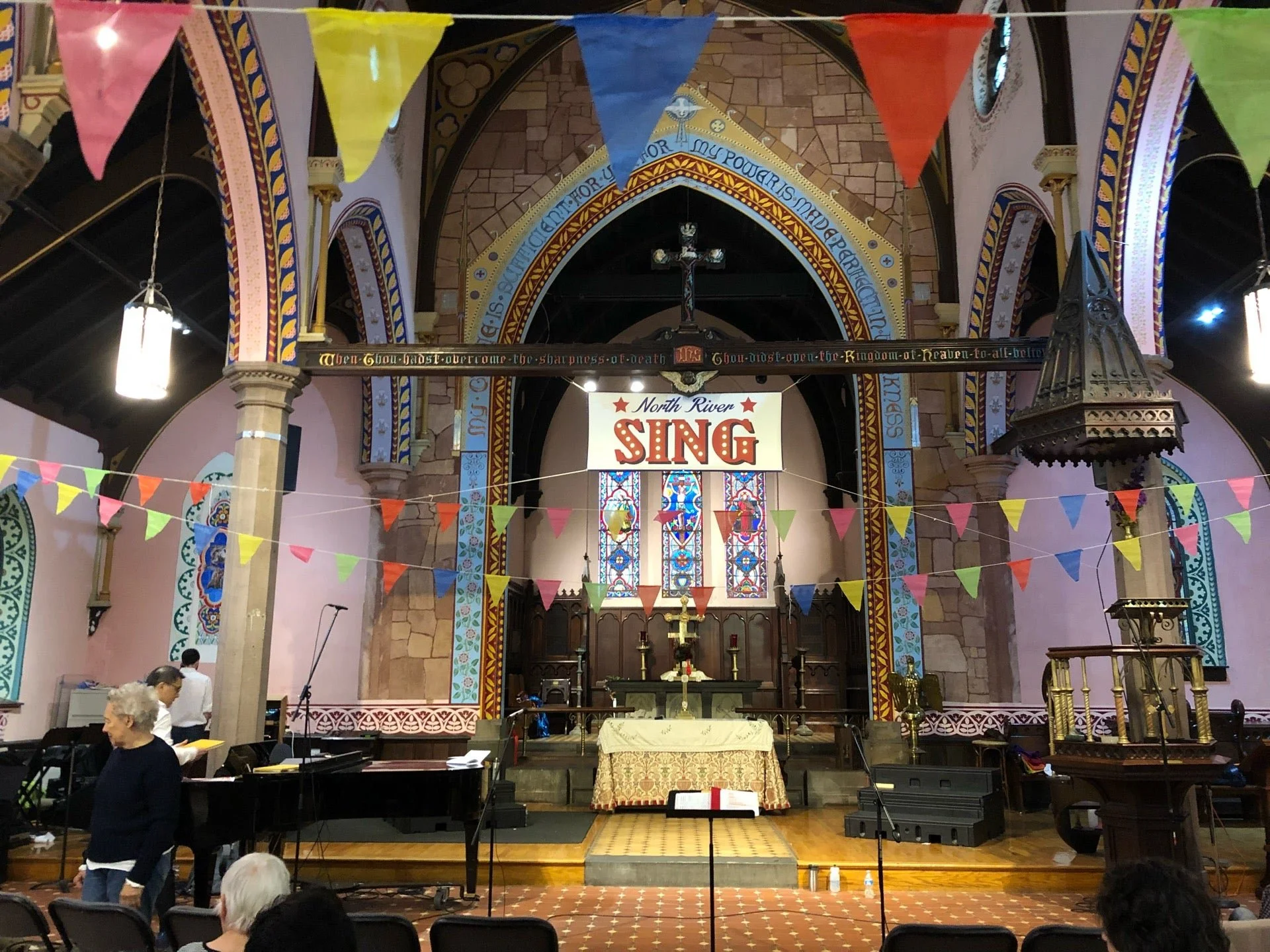Good Friday 2025
We know how this passage of the Gospel ends tonight, “…and the tomb was nearby, they laid Jesus there.”
Let me remind you about the part where you stood. It says, “Jesus went out to what is called, the place of the skull…There they crucified Jesus,
and with Jesus two others, one on either side, with Jesus between them…Pilate had an inscription written and put on the cross. It read, ‘Jesus of Nazareth, The King of the Jews’…it was written in Hebrew, in Latin, and in Greek.”
That an inscription was written in 3 different languages means that Jerusalem was a cosmopolitan place, or at least a pluralistic one.
Literacy in this environment was important.
In the March 2025 issue of Vanity Fair Magazine there’s a long article that describes Oklahoma’s Superintendent of Schools Ryan Walters and his efforts to create Biblical Literacy for the state…
Literacy is something I support.
The pathway to literacy for this politician is, in part, through purchasing tens of thousands of King James English Edition Bibles for 3 million dollars. (It’s not incidental to mention that the Bibles are sold by, and royalties given to Donald Trump enterprises).
The State Superintendent of Schools has also created guidelines which say students should learn that the 10 Commandments, brought down from Mt. Sinai by Moses, are the cornerstone of the legal system of the United States of America.
These particular pathways—Bibles sold by the President and Biblical teachings as the source of the modern justice system—absolutely underscore the need for religious and Biblical literacy. Biblical and theological literacy help us understand what we read and hear; so that we do not just offer our opinion…that’s especially important on Good Friday, when we meditate on the death of Jesus.
To say for example that Jesus’ death was because of “the Jews” is wrong. It’s also hurtful. Literally, some of you may have grown up in a neighborhood in which good Christian kids, after Noon Mass on Good Friday, beat up the first person in a yarmulke that they saw.
To say that Jesus death was because of “the state,” specifically the forces of empire. To then say that the modern empires of today, the one bombing Gaza; and another waging war in Ukraine; to say nothing of the millions of incarcerated individuals in the United States continue to be responsible for Jesus’ death, fails to wrestle with the theological significance of the resurrection of Jesus.
Even to say, “we did” meaning it is our collective sin, the guilt of humanity, which Christ atones for, does not actually answer, even theologically, the complexity of the world’s brokenness in the first and twenty first and each century between.
So it is we have more questions than answers.
Why? “why have you forsaken me?”
Jesus and Psalm 22 both ask this.
Were you there? a hymn writer says.
“Were you there when they crucified my Lord?
Were you there nailed him to the tree?
When they laid him in the tomb?”
The best way I know to answer spiritual questions is not through political partisanship, the American Right or the Cultural Left.
The best way I know to talk about the spiritual experience of God among us and the particularity of Jesus and his death on the cross, is through a Biblical invitation, “come and see…”
Our friend, Rev. Laurie Wurm of the Episcopal Church of Grace Van Vorst, soon to be of Philadelphia when she moves there next month, writes in a Homily for Her Mother, Heather; who died in a traffic accident in December of 2024 about an experience of seeing Jesus. More than that, when she writes, she illustrates that literacy is more than reading; it’s understanding Jesus’ teaching.
“My Mother” she says, “moved with my stepfather Joe to Mountain City. Tennessee in the year 2000.
Some of you have known and perhaps loved her for close to twenty-five years…
The Heather you knew was a member of this choir with a large collection of church lady hats and colorful dresses who lived in a beautiful house up on a mountain and spent much of her time volunteering at close to half a dozen local charitable organizations....
What you may not know is that Heather served on the board of Safe Haven Women’s Shelter having known what it was like to be abused by her first husband, my father.
She made meals for people who lost everything during hurricane Helene having known what it was like to worry about having enough money to feed her children.
She helped out at this church’s thrift store, the proceeds of which go towards paying the utility bills for those in need, having known what it was like to go without heat in the winter.
Like many people who have the privilege of living for a long time, my mother had several lives. I’m going to tell you a little about her life as a working mother with limited means…”
Rev. Laurie then beautifully shared about birthdays, hand me down clothes, the way that her mother made, “searching for enough change under the couch cushions to buy a pizza a game.” But if you were a colleague or friendly acquaintance of Heather’s then, you wouldn’t have known any of that.
“No matter how she struggled,” says Laurie, “Heather always wore bold colors, high heels, sparkly jewelry, bright lipstick and a welcoming smile.”
Rev. Laurie continued to describe the ways that the smile of her mother invited people into her life; not to be judged but to be listened to.
Going through years of memories in her mother’s house. Rev. Laurie found her senior yearbook from high school. She said her mom took out an ad in which she placed a picture of Laurie waving on her way to first grade with a snoopy lunchbox and a caption that read,
“The smell of new notebooks and pencils, the shine of new lunch boxes…. New beginnings!”
“These words say more about Heather” says a grieving daughter, “than they do about me.”
Then the preacher who loves Jesus talks about Jesus. Rev. Laurie says, “in Mark’s Gospel, Jesus is indignant that his disciples think that his time is too precious to be wasted on children. He tells them to let the children come to him and then declares, “whoever does not receive the kingdom of God as a little child will never enter it.”
As an illustration of the importance of literacy Rev. Laurie asks, “What does this mean?”
It’s not as easy as a literal interpretation. “My Mother” says Laurie, “was not a child. She was not gullible. And she was not innocent.”
But for her, just about every day had the smell of new notebooks, pencils and the shine of new lunch boxes.
Just before she died, she was driving down her mountain to the art center wearing snowman earrings and a vest covered with little Christmas presents, evergreens trees and reindeer.
I know what her mood was- she was expectant and excited about the new day.
I know it because that is how she was just about every morning.
Psalm 118 doesn’t suggest, it demands: “This is the day that the Lord has made. Let us rejoice and be glad in it.”
If you remember Heather for nothing else, please remember her for doing that.
If this is an example of Biblical literacy, which also creates a portrait of a mother—Laurie’s Mother—what is our portrait of Jesus?
How does Biblical literacy help us see him? Our passion reading says, “When Jesus saw his mother and the disciple whom he loved standing beside her he said to his mother, “Woman, here is your son” Then he said to the disciple, “Here is your mother.”
I’d like to think that without political opinion, or opinion at all; in a nutshell, a portrait of Jesus can be summarized in an encounter Jesus has with a young man who asks Jesus how to find eternal life. Jesus, interested in literacy, like the State Superintendent of Schools in Oklahoma—let’s be charitable—asks the searcher what the scriptures say.
The man says scriptures say, “love the lord your God with all your heart and soul and all your might. And love your neighbor as yourself.”
Yes! says Jesus.
In other words, you got this!
But then the man asks, “Who is my neighbor?”
Jesus tells a story; he’s always telling stories rather than offering his opinion. The story is about the good Samaritan and the idea that your neighbor might not be the one who speaks the same language you speak, lives next to you, or shares your cultural—or religious practice. But in fact, your neighbor is the one who helps you. Which one helped the person in need in this story asks Jesus.
The one who showed mercy.
Yes! Go and do likewise.
Today, between two criminals Jesus is crucified. But before he dies, in the Gospel of Luke Jesus says to the men on either side of him, “today you’ll be with me in paradise.” Maybe a better and even more direct indication of what paradise, heaven, means is in the exchange Jesus has with his mom and friend here in John…
In the same way Jesus talks about neighbors; he’s talking about family,
“This is your mom.”
“This is your son.”
Not because they are related, but because this is what we are supposed to do to inherit eternal life, “love the lord your God with all your heart and soul and might and love your neighbor as yourself.”
Who is my neighbor?
Jesus is teaching us about neighbors about family and about the path to heaven right up until he dies.
This is your son.
This is your mom.
Take care of them.
We honor the path of Jesus when we live in love;
Not when we pretend a life of Jesus is about anything else.


